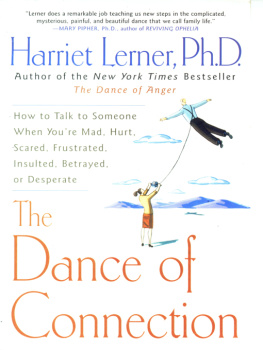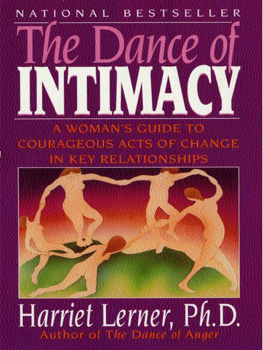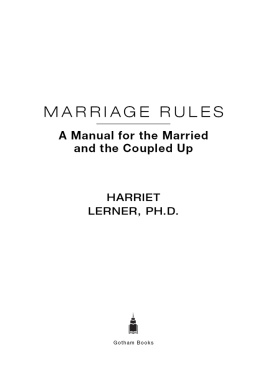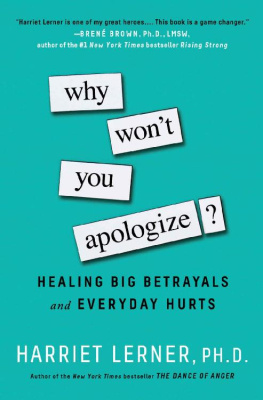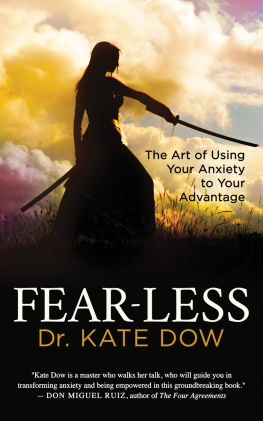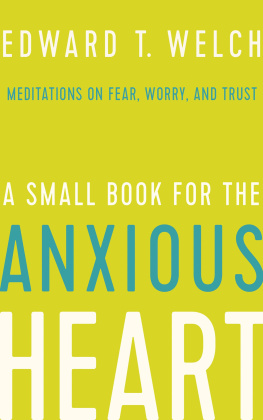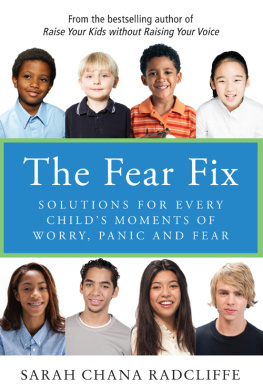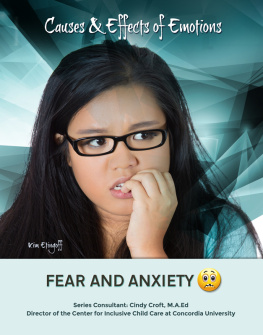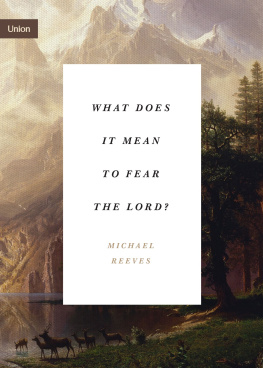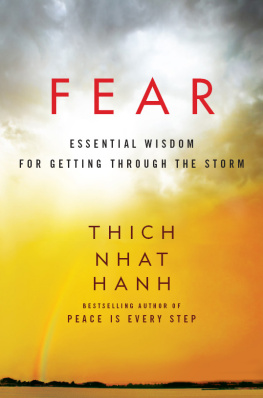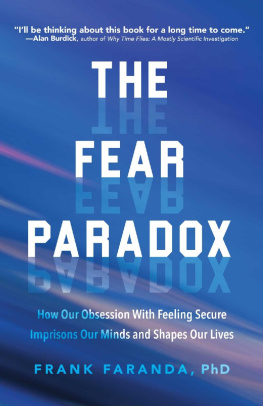The Dance
of Fear
Rising Above Anxiety, Fear, and Shame
to Be Your Best and Bravest Self
Harriet Lerner, Ph.D.

In memory of my mother,
Rose Goldhor
Contents
Fear stops me from doing so many things, a neighbor confided when I mentioned the subject of this book. Then, without further ado, she launched into a description of her coworker Carmen, a woman who exuded such a deep sense of calm, joy, and peacefulness that everyone wanted to be around her. Carmen never feels fear or other negative emotions. Shes always in the flow of the present moment. She really lives each day to the fullest. My neighbor paused to catch her breath, then exclaimed: I would do anything to be like Carmen!
She spoke so earnestly, her voice ringing with italics, that I restrained myself from suggesting that maybe Carmen had multiple personalities and that one of her alters might be sitting mute in some corner having wall-to-wall panic attacks. But I did tell her this: The only being I have ever known who was entirely free of fear and always in the flow was my cat, Felix. When Felix was alive, I aspired to be like him, much as my neighbor aspired to be like Carmen. I could relate.
FELIX, MY ROLE MODEL
Felix was my little Buddhist, my role model for mindful living. He demonstrated a healthy fight-or-flight response when threatened, but he only felt fear when fear was due. He became anxious and agitated when forced into a carrying cage, because he knew very well it meant a car ride to the vet. But he didnt let fear, worry, and rumination spoil an otherwise perfectly good day.
By contrast, I recall my own human experience anticipating my first allergy shot as a child. For a good week before the actual appointment, I freaked myself out with fearful imaginings, all of them having to do with long needles and terrible pain. My mother, who had certain Key Phrases to Live By, informed me that a coward dies a thousand deaths; a brave man dies but once. She learned this aphorism from her younger brother when he went off to fight in World War II.
I personally found no comfort in her words. What sense did they make to a nine-year-old? I wasnt brave, I wasnt a man, and why was my mother bringing death into the conversation? When I was older and had developed the capacity for abstract thinking, I understood the lesson she was trying to convey. In essence, my mother was encouraging me to be more like Felix.
Felix lived in the moment. When he played, he played. When he ate, he ate. When he had sex, he had sex, utterly unencumbered by fear, shame, or guilt. Once fixed (the downside of being a pet), he settled immediately into a perfect acceptance of his situation. Wherever you go, there you are, was the motto I believe he lived by.
This capacity to inhabit the moment granted Felix a kind of profound self-acceptance. When he licked his fur, he didnt worry about whether he was doing the job well enough, or whether he was taking too long to lick down all his hair, or whether certain of his body parts werent all that attractive and perhaps shouldnt be displayed to my dinner guests. Nor did he dissipate his energy with anxious thoughts such as: Whats wrong with me that I dont make more fruitful and creative use of my time?
Because Felix didnt live a fear-driven life, he was able to operate from his essential Felixness. When he wanted connection, he would jump on my lap without stopping to wonder whether I might find him too needy and dependent (especially for a cat). With equal aplomb, he would jump off my lap and saunter out of the room when he felt like it, never worrying that I might take his departure personally and feel really hurt. I could go on, but you get the picture.
A sociobiologist friend tells me that I have an idealized notion of Felixs inner emotional and spiritual life, but I disagree. Im not saying that all cats are like Felix. Ive seen my share of traumatized felines who cower or scratch when strangers approach. But I observed Felix almost daily for more than ten years before he keeled over dead one afternoon on our back porch. Im convinced that it simply wasnt in his nature to get bogged down in fear and shame.
Face It, Youre Human
Of course, Felix didnt have it all. If he missed out on the miseries of being human, he also missed out on some uniquely human pleasures, from reading a riveting novel to falling in love. One might debate whether it is preferable to be a cat or a person, but why get into it? If you are reading this now, you are not a cat and never will be. So along with the good days, youre going to experience the entire range of painful emotions that make us human.
This means that youll wake up at three in the morning searching your breasts for lumps. Youll worry that your daughter has dropped out of her drug treatment program (again), that your partner is getting bored with you, that youll end up a bag lady if you leave your job, that your memory is getting more porous with each passing day, and that possibly youre going crazy.
You can make your own list. No one is immune to the grip of anxiety, fear, and shamethe big three that muck up our lives. These are the uninvited guests. When tragedy or hardship hits, they may become our constant companions.
SIX EASY STEPS TO CONQUERING FEAR AND ACHIEVING BLISS?
I bristle at feverishly inspirational books that make large and silly promises. Break free from fear and youll soar like an eagle, reverse the aging process, and attract a bevy of wildly sexy and appreciative lovers. I recently eyeballed a new self-help guide that states: Bliss is available to anyone at any time, no matter how difficult life may be. When I read such statements, I am prone to entertaining mean-spirited thoughts, such as hoping that the author is dealt some unfathomable loss that will serve as a test case of his or her bliss theory. Since I am really a very nice person, these are but passing uncharitable fantasies. Still, I believe it is arrogant and deeply dishonest to tell people that they can transform their own reality, no matter how dreadful their circumstances, with the acquisition of a few new skills and a brighter attitude.
Of course, each of us can move in the direction of experiencing less fear and more calmness, love, and peace. This is a worthwhile and entirely possible venture. Meditation, therapy, friendship, creative pursuits, exercise, yoga, gardening, authentic conversation, reading, and listening to music are but a few of the paths we can take to become more whole and centered and, in the process, lessen fears grip. With practice, we can also change our habitual ways of thinking. We cant stop bad things from happening, but we can stop our relentless focus on how things were or how we want them to be, and develop a deeper appreciation for what we have now. There is no quick fix, however, when it comes to managing fear and suffering in our lives, or even for coping with the simple stresses of ordinary life.
DECODING FEAR
Fear is not something to be conquered or eliminatedor even tackled, for that matter. Instead, we may need to pay close attention to its message. Most of us experience fear as a kind of stop sign or flashing red light that warns: Danger! Do not enter! But we may need to decode that signal and consider what its trying to convey. What is the actual nature of the danger? Is it past or present, real or imagined? Are we feeling anxious because we are boldly charting new territory, or because were about to do something stupid?
Sometimes we feel a stab of fear or a wave of anxiety because our unconscious is warning us that were truly off track. Perhaps we shouldnt send that angry e-mail or buy that adorable fixer-upper house. Maybe we shouldnt rush into a particular job, conversation, trip, marriage, or divorce. In such cases, fear can operate as a wise protector, one we need to honor and respect.
Next page

